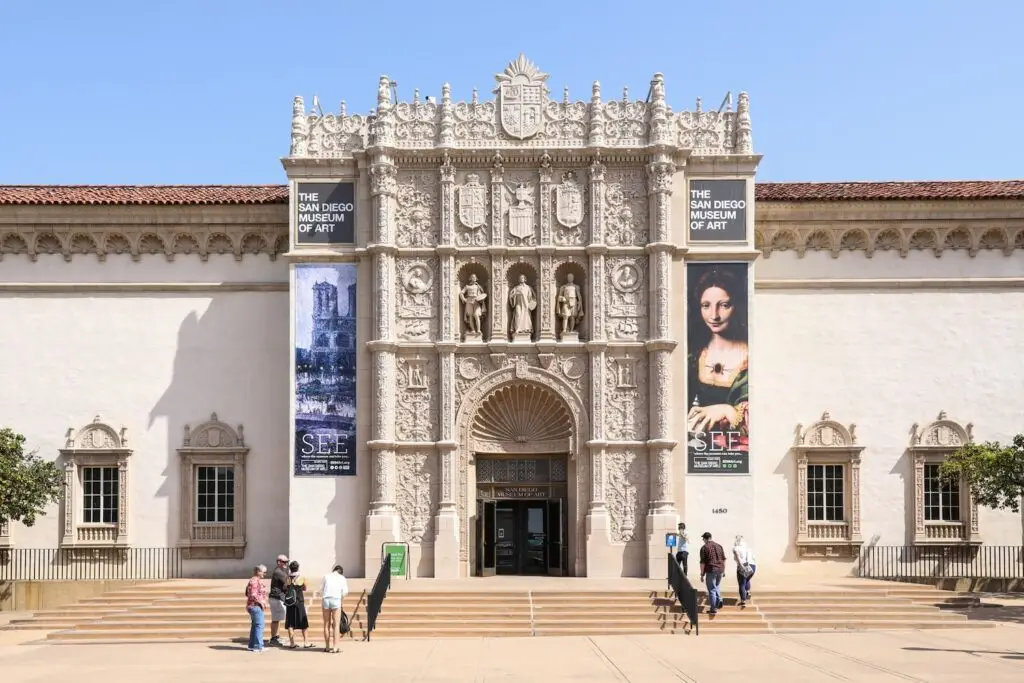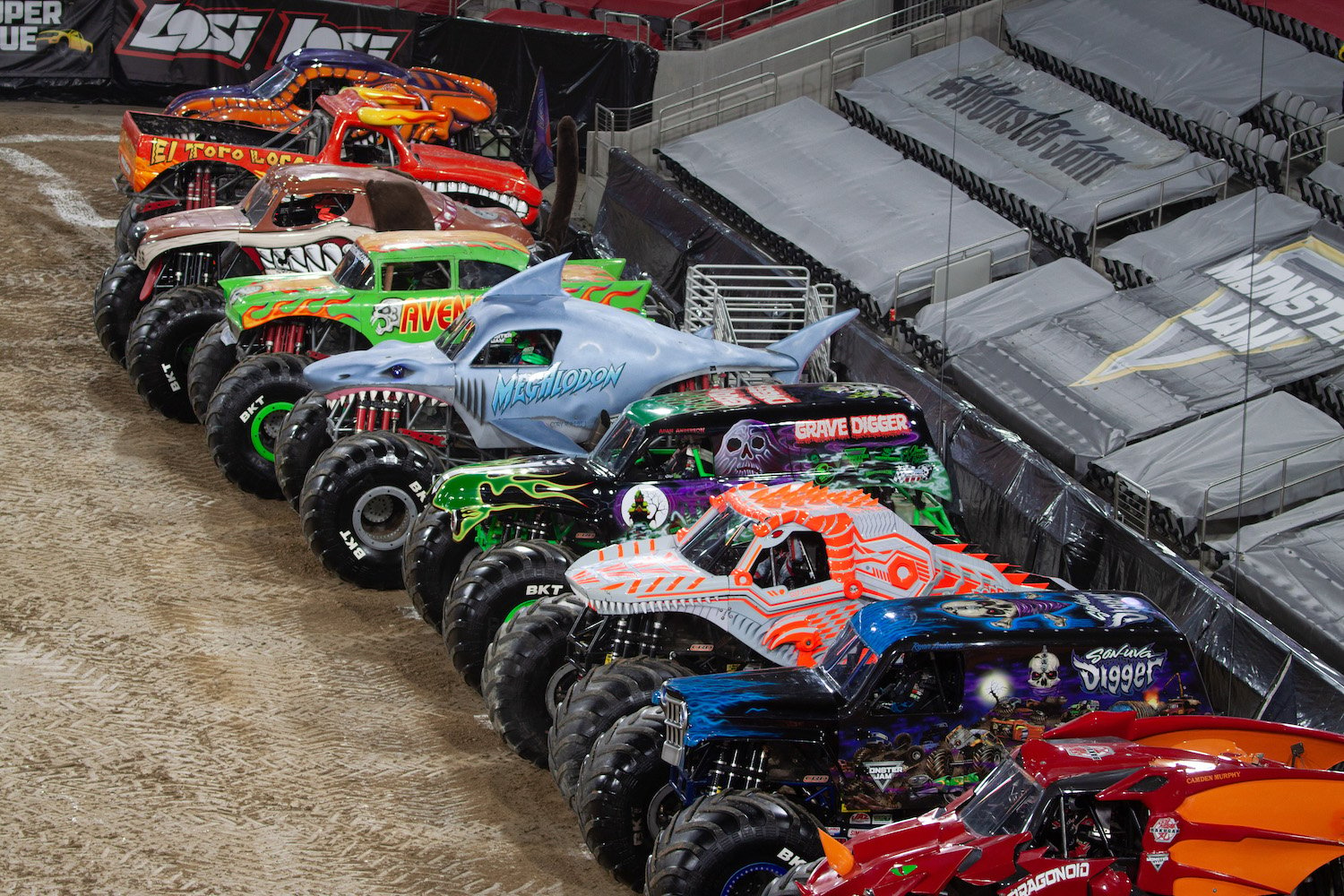I have never seen so many children in one place, and I used to teach elementary school. Clutching toy monster trucks, they wait in line to meet leather-jacketed drivers and scribble drawings of trucks on the asphalt in chalk. Their parents snap photos of them in front of animal-themed vehicles named Monster Mutt and Megalodon and shell out $30 for them to chug along in motorized, Rottweiler-sized vehicles or build their own wooden mouse-sized ones.
I’m at the Pit Party at Snapdragon Stadium, the dazzling pregame to the San Diego iteration of Monster Jam, a touring exhibition-slash-competition promising rip-roaring monster truck action. Though the trucks have previously appeared at Petco Park, this is Monster Jam’s first event at the new stadium.
But, right now, it kind of just looks like a car show, if all the gearheads were under five feet tall.
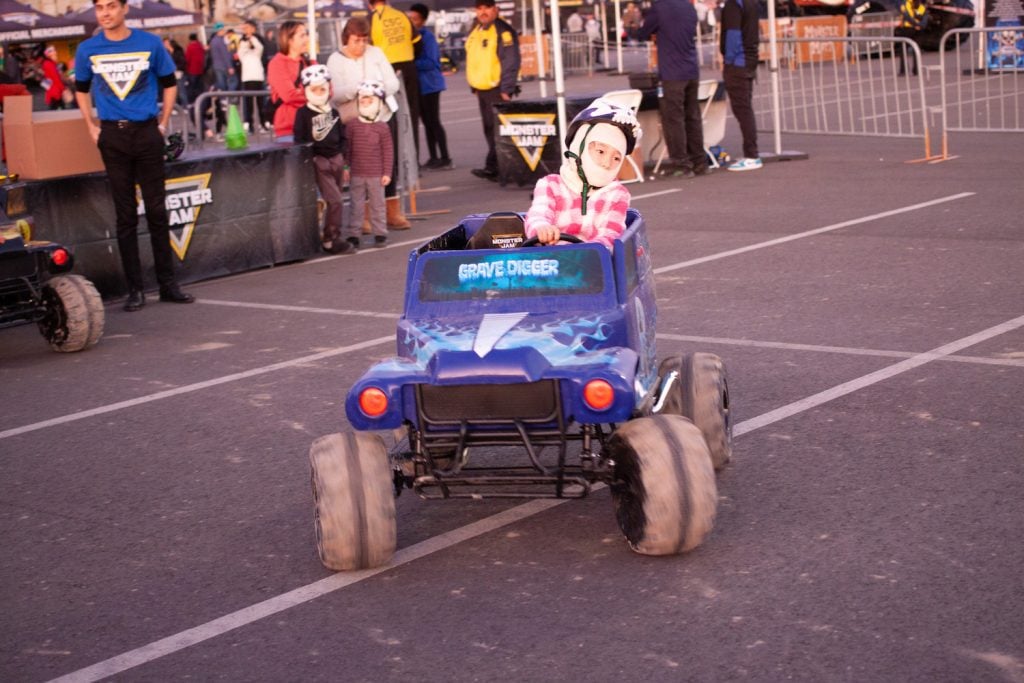
This interactive extravaganza and the main event combine for the greatest toy commercial I have ever seen, a methanol-fueled triumph of American marketing.
I queue alongside seven-year-olds to try and interview a few drivers, who look politely bemused when a lone adult woman approaches them wielding an iPhone. Mostly I want to know how they ended up here. Sure, “monster-truck driver” may be a common third-grade ambition. But how does one go from wheeling toy trucks around a playmat to rambling around America in the real deal?
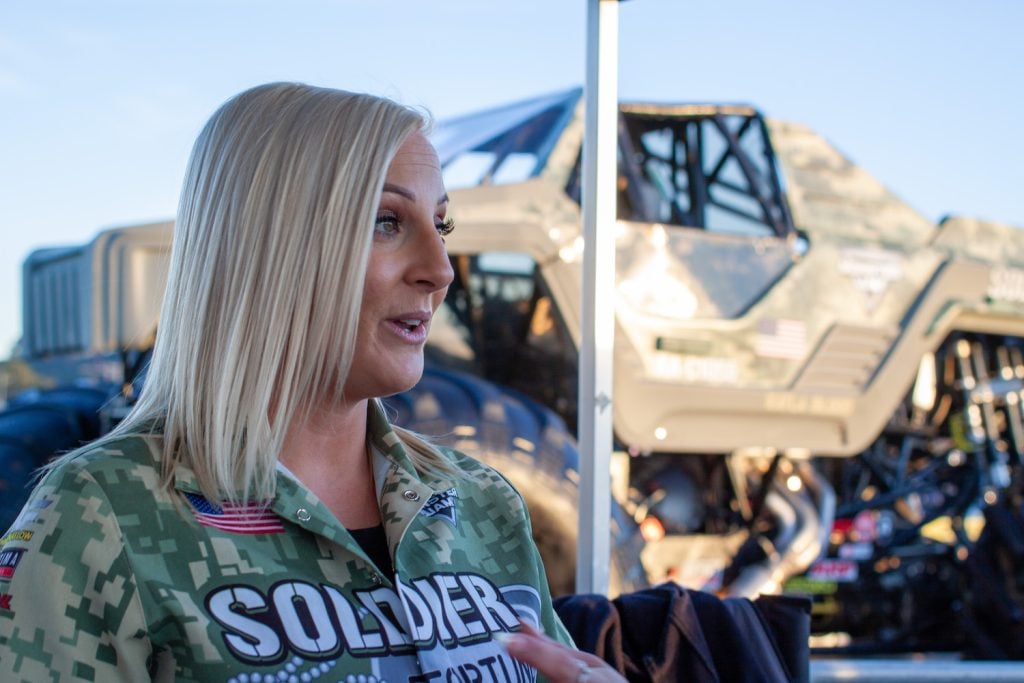
“I got into Monster Jam through ATV motocross, and I would simply just compete at Monster Jam intermissions,” says Kayla Blood, who helms camo-wrapped truck Soldier Fortune as the only woman driver on the circuit. “So I did that at an event, and about a week later, I got a phone call from Monster Jam wanting to put me in a truck and test me, and I was like, ‘Absolutely!’ I’ve been doing this for about eight years now.”
David Olfert, who drives a 10-foot-tall truck covered in a metal shell shaped like a toothy-grinned velociraptor, answers my query with the same well-worn cadence of any media-trained athlete. “I was a fan of monster trucks and Monster Jam since I was a kid, and worked my way up, worked on the trucks, and finally got to drive,” he says.
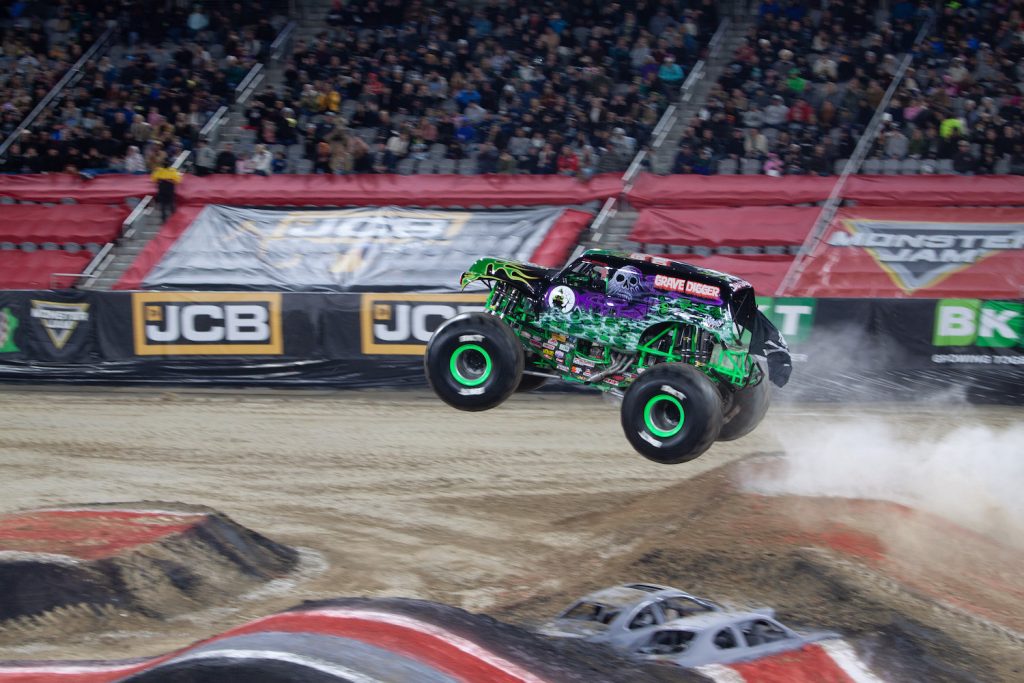
For others, it’s a family business. Adam Anderson stepped behind the wheel of the legendary Grave Digger in 2016, taking over for his father, Dennis, who created the truck. There’s no Monster Jam without Grave Digger—it’s so famous even I, a motorsports agnostic, have heard of it. In fact, there are seven different Grave Diggers active at any given time (meaning that Adam isn’t always the driver) so that it can appear at every event. When I mentioned Monster Jam to a colleague, she told me Grave Digger had won the one time she attended. “Grave Digger always wins,” she added. Adam’s younger brother Ryan is also part of the dynasty, driving the less-cool offshoot Son-uva Digger.
As it turns out, attending runs in families, too. Six-year-old Gianna has been going to Monster Jam since before she can remember—today is her sixth time.
“I did it as a kid, so I figured I’d continue with her,” her mom, Jaden, tells me. (Monster Jam has been running since 1992, so its original fans are right at the age to pass the passion along to a second generation.)
A few minutes later, a cheery voice announces that the pit party is ending, as the drivers have to get “suited and booted” for the event. We follow the throng to the gates.
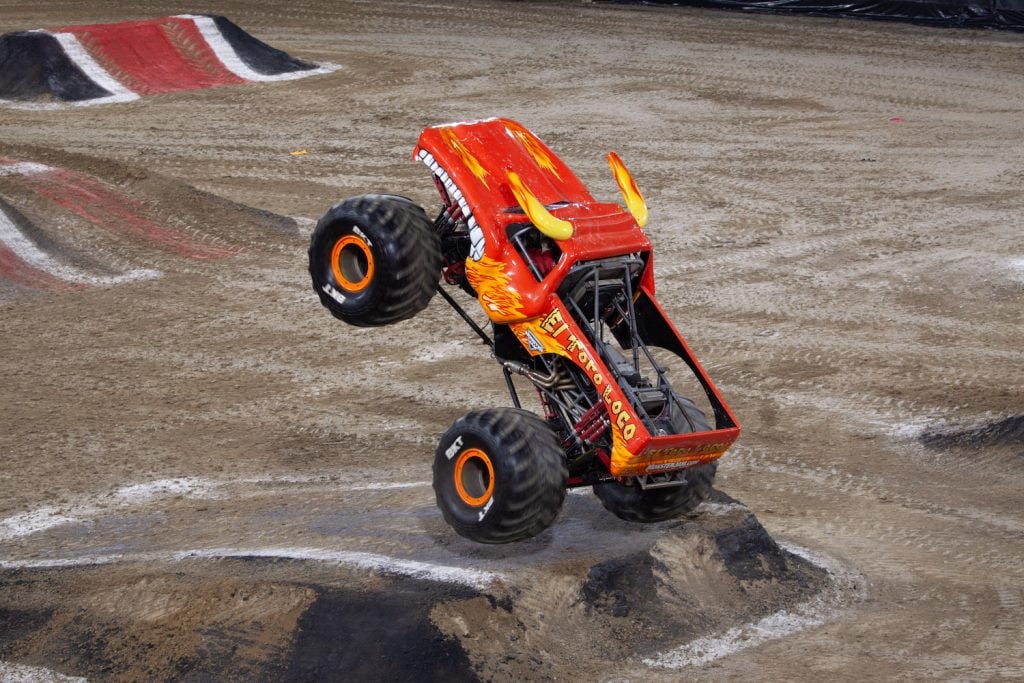
From Snapdragon’s Presidential Suite, I have a birds-eye view of the track: mounds of dirt arranged into ramps; painted red, gray, and black; and seeded with skeletal sedans that will be crushed over the course of the evening. At 7 p.m., the monster trucks roar out onto the track. It’s LOUD. Suddenly, I understand why so many kids’ ears are safely cocooned in headphones.
I expect trucks slamming into one another and grinding Mitsubishis into dust, but there are actual, skill-driven events—first, a race in which trucks compete head-to-head in bracketed rounds. Then, each driver shows off their skill for tipping their truck forward or backward into a wheelie or whipping it around in dizzying donuts.
Finally, there’s the freestyle round, in which every driver gets two minutes to fling themselves off the ramps, moonwalk their cars on two tires, and attempt backflips. Audience members vote on their phones to determine the winners of the latter two events, and the driver with the most cumulative points takes the crown.
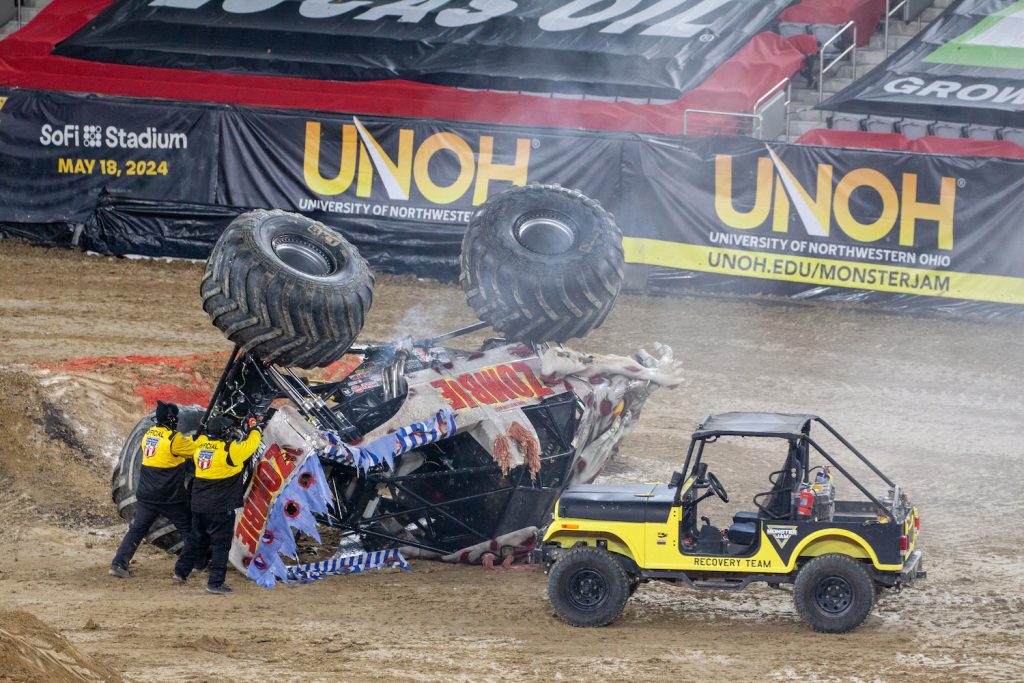
Winning is cool, obviously. But as the drivers themselves will tell you, the mark of a true Monster Jam champ is a willingness to “drive the car into the ground.”
During its race against Megalodon, Bakugan Dragonoid—a dragon-themed truck inspired by a character from the kids’ anime franchise—flips on its back and can’t recover. The crowd roars as a Cat truck arrives to haul it back over.
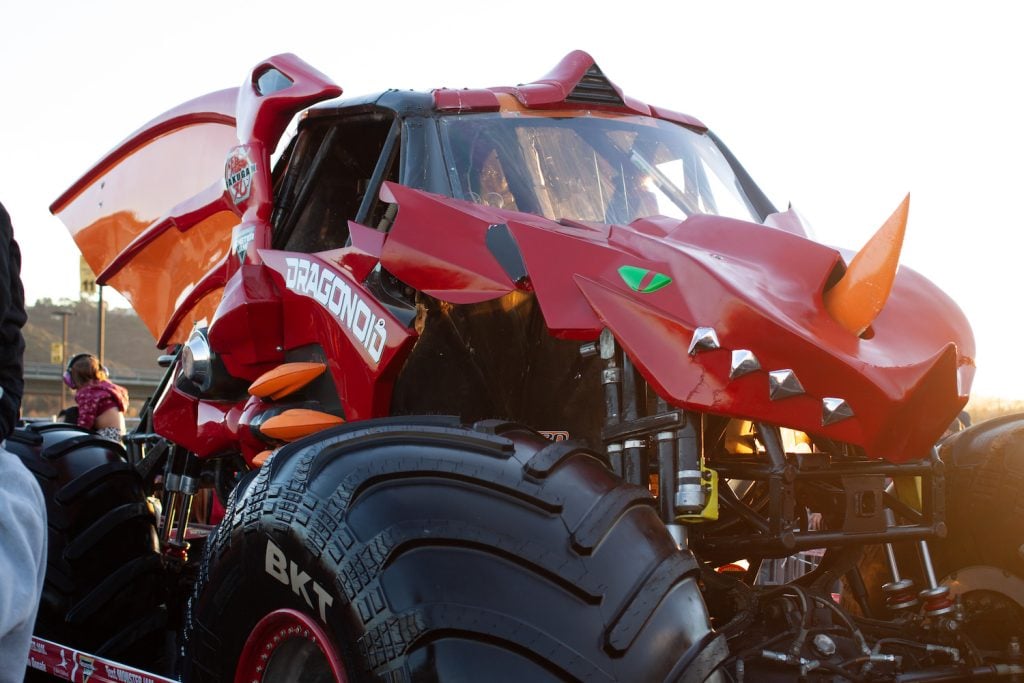
When Bakugan Dragonoid finally turns rightside up, I sort of expect everyone to cheer, like in a movie about an underdog boxer who hauls himself back into the ring with blood streaming from his nostrils. Instead, the truck limps off, pouring fluids, to a bored silence.
As the show goes on, though, I sense my own bloodlust igniting. Monster Jam, much like American football or navigating an airport, is stop-and-start: 20 seconds to two minutes of brutal action punctuated by long periods of waiting. Can I be blamed for feeling the urge to join in with the audience’s hungry whoops as more and more trucks crash, roll, and catch fire?
But if I’m a little bored for most of the evening, it’s probably because Monster Jam isn’t for me—it is, at its heart, all about the kids. The usual replays and sponsor shoutouts on the jumbotron are interspersed with actual toy commercials promoting miniature versions of popular trucks and plastic ramps to shoot them off of. At the start of the action, a call-and-response theme song plays (“When I say monster, you say jam!”), like we’re all about to watch a cartoon.
Whenever it’s Zombie’s time to perform, its driver, Bari Musawwir, takes a minute to do a lap, prompting hundreds of children and adults to waggle stiff zombie arms in the truck’s direction. It’s like “the wave” for the undead. A spectacle that only exists at Monster Jam.
The show is stitched together with familiar platitudes. “This is Monster Jam, and we go by one thing: Expect the unexpected,” one announcer declares.
Later, when Kayla Blood makes her triumphant, tearful return (Soldier Fortune was waylaid, briefly, by “gremlins,” the announcer shares), Blood admits, “I know there’s no crying in Monster Jam, but these are happy tears.”
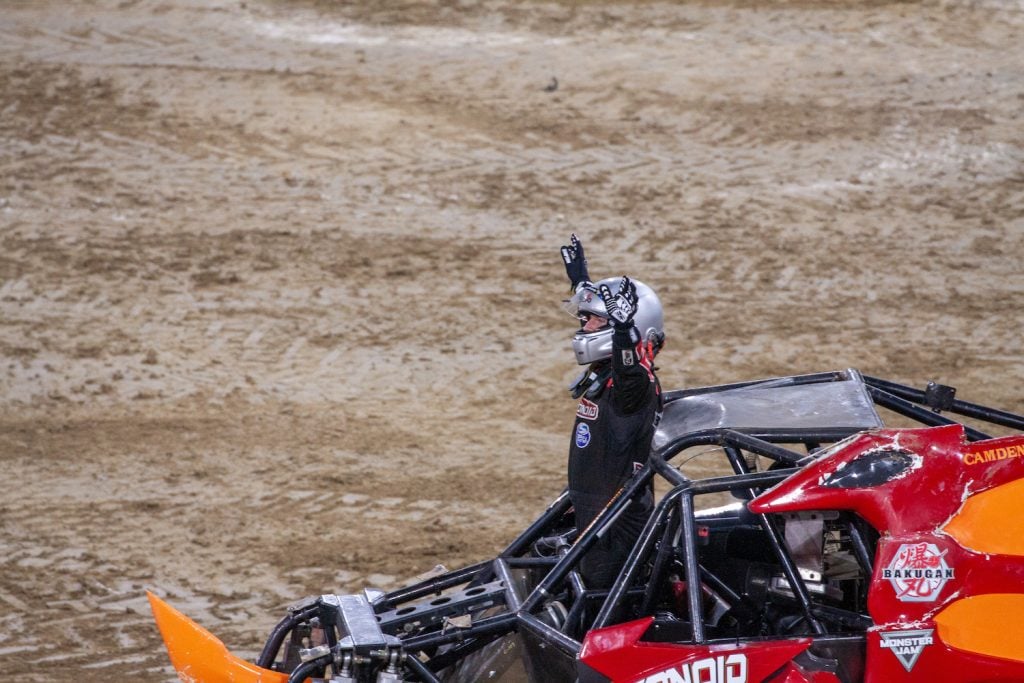
Blood almost wins the skills challenge, but she’s edged out by a recovered Bakugan Dragonoid. In the end, after all the jumps have been jumped and the flips flipped, three trucks are tied, each with 28 points: Grave Digger, Bakugan Dragonoid, and Megalodon.
When the cheery announcer steps up to the mic to laud the winner, however, only one name is on her lips—Grave Digger. The crowd goes wild. Adam Anderson’s mustache twitches over his wide grin. The other two 28-point drivers smile and wave and don’t say a thing, perhaps because they know, gazing out at the sea of size-4T Grave Digger t-shirts in the stands, that this was always how it was going to be.
PARTNER CONTENT
It seems you can expect the expected at Monster Jam. But maybe that’s part of its charm.
Monster Jam returns to Snapdragon Stadium January 27–28.



